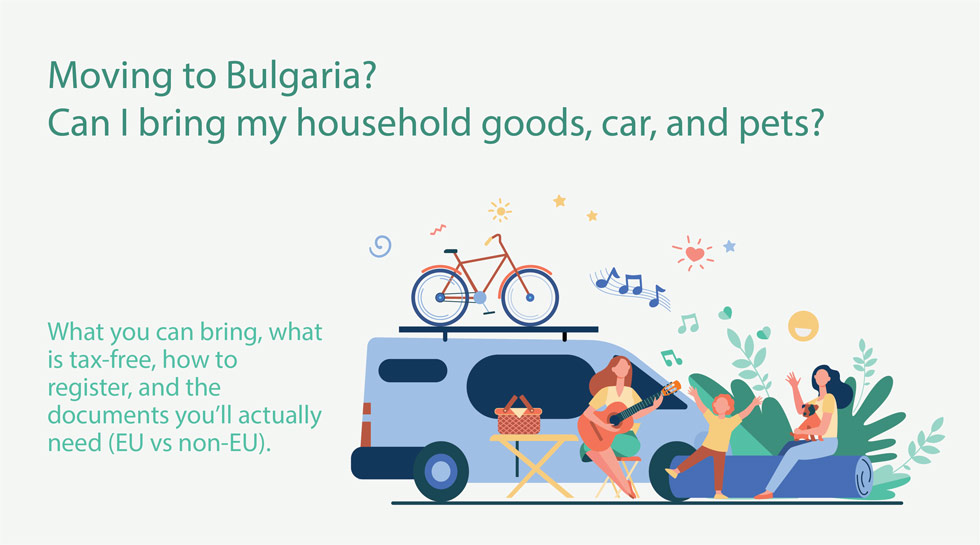Can I bring my household goods when I relocate to Bulgaria?
Yes.
- From the EU: free movement – no customs.
- From outside the EU: you can usually import your used personal property duty-free under the EU Transfer of Residence (ToR) relief—if the items were owned and used ≥6 months, you lived outside the EU ≥12 months, and you import within 12 months of settling in Bulgaria. You can’t sell/loan the relieved items for 12 months after import.
Bulgaria applies the EU duty-relief rules for the “personal property” of people moving residence. Eligible goods (typical household effects) are admitted free of import duties when you transfer normal residence to the EU; vehicles qualify if they were used by you for ≥6 months before you moved. The relief typically applies to items you bring within 12 months of establishing residence, and you may split shipments if they are declared. Items not covered include alcohol/tobacco and goods indicating commercial intent. Bulgarian Customs lists the conditions and sample evidence (proof of 12-month stay abroad, proof of settling in Bulgaria, proof of ownership/use, vehicle registration, etc.). Note: items admitted under relief are under customs supervision for 12 months; you must notify customs before any sale/transfer in that period.
More information and legal grounds:
- Bulgarian Customs Agency – Personal property on transfer of residence (conditions, evidence, vehicles, 12-month rules). Customs.bg
- EU Regulation 1186/2009, Title II, Ch. I – ToR (ownership/use ≥6 months, 12-month import window, 12-month no-transfer rule). EUR-Lex
Can I bring my vehicle?
Yes.
- Customs: From the EU – no import duty/VAT; from outside the EU—duty/VAT may apply unless you qualify for ToR (see above; vehicles must have been used ≥6 months).
- Registration: If the car will be kept in Bulgaria, register it with the KAT (Traffic Police; in Bulgaria, this is the MOT registration) within one month of acquisition (or once you become a resident and the vehicle is based here). Technical inspection/insurance and standard fees apply.
- Customs side: Under ToR, a privately-owned vehicle used by you ≥6 months can be cleared duty-free when you move from a non-EU country, provided you import it within 12 months of settling and you don’t sell/transfer it for 12 months after clearance. Otherwise, non-EU imports are usually subject to customs duty + 20% VAT on import. (Standard VAT rate confirmed by Bulgaria’s NRA.)
- Road registration: After customs clearance (if applicable), book initial registration at KAT. The Ministry of Interior notes: “Within one month after acquisition, vehicles have to be taken for registration at the Traffic Police Units.” Expect third-party liability insurance, eco fee (for some used imports), and a technical inspection as part of/alongside registration.
More information and legal grounds:
- Bulgarian Customs – vehicle conditions under ToR (use ≥6 months; documentation). Customs.bg
- Ministry of Interior (KAT) – Initial registration of vehicle (deadline & process). MVR
- EUR-Lex: EUR-Lex
Can I bring my pets (dogs/cats/ferrets)?
Yes, if you meet EU pet travel rules.
- From the EU/EEA: travel with an EU Pet Passport and a valid microchip + rabies vaccination (21-day wait after the primary jab). European Union
- From outside the EU: enter with an EU Animal Health Certificate issued by an official vet ≤10 days before entry; microchip + rabies vaccine required (and for some “unlisted” countries, a rabies titer test + 3-month wait). Limit is max 5 pets for non-commercial movement; enter via a designated Travellers’ Point of Entry.
Pet movement into Bulgaria is subject to EU rules (Reg. 576/2013). Your pet must be microchipped (ISO-compatible), vaccinated against rabies, and travel with the required documents. EU-based owners use the EU Pet Passport; non-EU travelers use the EU Animal Health Certificate prepared by an official state vet just before travel. Some origins require an antibody titer and, for dogs, specific timing for Echinococcus treatment. Bulgaria’s MFA confirms the document types and references the national ordinance.
More information and legal grounds:
- European Commission – Travelling with pets (EU passport, microchip, health certificate, limits). European Union
- EU – Travellers’ Points of Entry (designated entry points for non-EU arrivals). Food Safety
- Bulgarian MFA – Travelling with pets (documents & ordinance reference). Ministry of Foreign Affairs
- USDA APHIS – Bulgaria pet travel (microchip & rabies timing guidance for U.S. travelers). APHIS
Timing & standard limits (quick facts)
- Household goods (non-EU to BG): own/use ≥6 months; import within 12 months of settling; no sale/loan for 12 months without notifying customs; split shipments allowed if declared.
- Vehicle registration: take the vehicle to KAT within 1 month after acquisition (or once it is based in BG).
- VAT/duty if ToR doesn’t apply: standard VAT 20% on imports; customs duty may apply on non-EU cars. (Check customs tariff for your VIN.)
- Pets: generally max 5 animals for non-commercial movement; check whether your route requires a designated entry point and whether your origin needs a titer test.
You Will Also Like To Know About:
- Staying in Bulgaria FAQs
- Renting a Home in Bulgaria: Practical FAQ for Newcomers
- Bulgarian Customs Rules for Imports and Exports FAQs
- Buying Property in Bulgaria
Legal Disclaimer: The information in this article (part of the Stay in Bulgaria FAQ series—EU/EEA/Swiss citizens, UK nationals, third-country nationals, citizens of developing countries, digital nomads, and family members of Bulgarian citizens) is for general informational purposes only and does not constitute legal advice. It does not create an attorney-client relationship. Laws and procedures (including Schengen/90-day rules, Type D visas, residence permits, and related EU/Bulgarian regulations) are subject to frequent changes; therefore, content may be incomplete or out of date. External links are provided for convenience; we are not responsible for their content. For advice tailored to your situation, consult the Migration Directorate (Ministry of Interior), the Ministry of Foreign Affairs, or a licensed immigration attorney. Last updated: September 2025.



